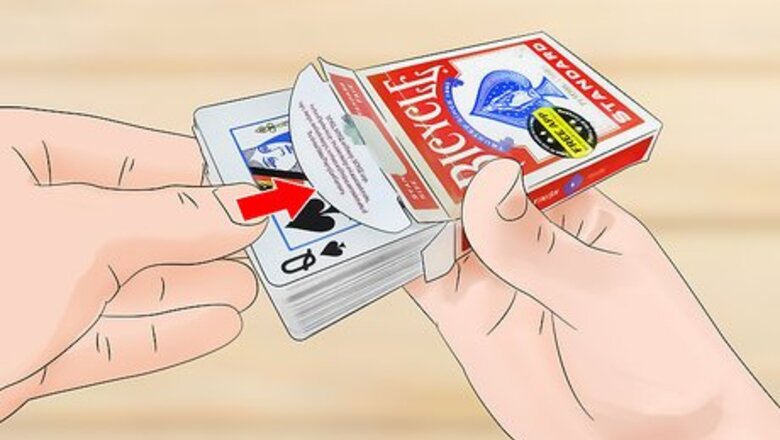
views
Storing Your Cards
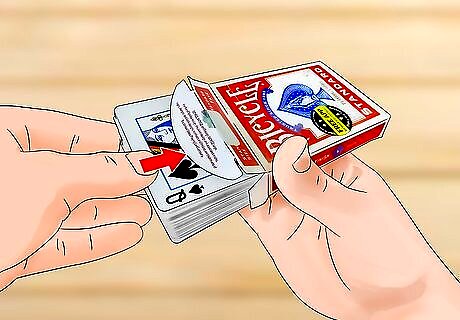
Keep your cards in their box whenever you aren't using them. Avoid using rubber bands to hold your cards together or keeping them in a loose stack since you can easily deform them. Whenever you're done playing with your cards, put them back into the box they came in so they don't bend. Make sure the cards fit tightly in the box so they don't move around and damage the corners. If you don't have the original card box, you can buy deck boxes or cases from hobby shops. Keep all of your card boxes tightly pressed against each other so the cards inside stay flat.
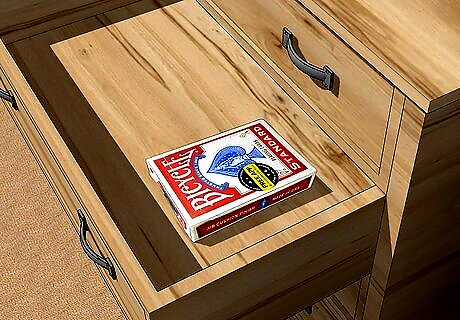
Store the cards in a cool, dry place to avoid warping. Look for drawers, closets, or cupboards in a living room or bedroom to store your cards. Avoid keeping them in your kitchen or where they're in direct sunlight since they could warp or fade. Stand the boxes on their edge or lay them flat wherever you store them so they don't move around or get bent. Place cards on a high shelf if you want to keep them out of children's reach. Don't leave cards in your car since they can easily warp or deform over time. You can buy card cases that hold multiple boxes at a time from hobby stores or online.
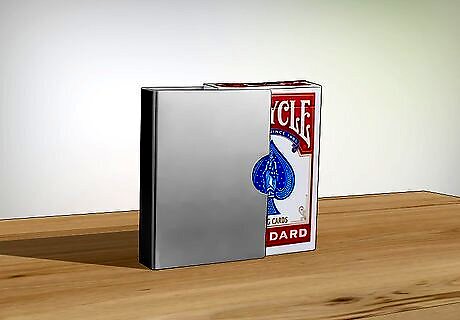
Carry the deck in a metal clip to prevent the corners from bending. Metal card clips fit around your deck of cards while they're in the box so it doesn't deform while you travel. Push the deck of cards into the open side of the clip and push it in until the edges are flush with the clip. Keep the cards in your pocket or a bag so you can travel with them. Some metal cases will only fit standard sized cards. Make sure the case you get is the same size as your deck or else it won't protect them as well.Tip: Avoid putting the cards in your pocket without a metal clip since sweat or moisture could absorb into them.
Keeping Your Cards Clean
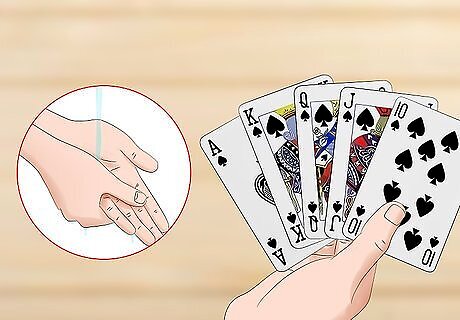
Wash your hands before handling your cards. Your hands have dirt and oils on them that can transfer onto your playing cards, and even small amounts can make it difficult for them to slide against each other. Be sure to wash your hands with soap and water before you start playing with the cards so your cards stay fresh and last longer. Make sure your hands are completely dry before you handle your cards or else they may get damaged. If you don't want to wash your hands every time, use sanitary wipes or hand sanitizer.
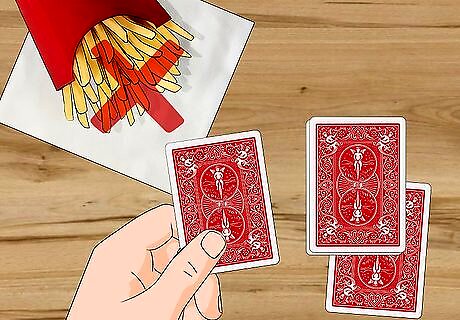
Avoid eating greasy foods while playing cards. Even though playing cards goes great with chips or nuts, the grease can transfer to your cards and cause stains or warping. Choose snacks that aren't greasy or sticky, like fresh vegetables or fruits, whenever you play cards with others. If you can, avoid eating anything while you're handling your cards so you don't risk getting them dirty. If you have a greasy snack, be sure to wash your hands thoroughly before playing with your cards again.
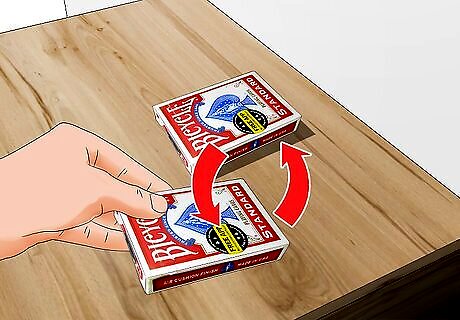
Cycle through different decks so they don't wear out as fast. Don't use the same deck of cards every time you play since it will start to fade and bend faster. Aim to keep at least 2-3 decks of cards in your home so you can choose between them each time you play. Change the decks you use every few games you play so you don't keep shuffling and handling the cards. Some cards are thicker than others so they can handle a little more wear before fading or bending.Tip: If you have a nice deck of cards, set it aside and only use it for special occasions. Instead, use a cheaper deck when you want to practice shuffling or when you're learning a game.
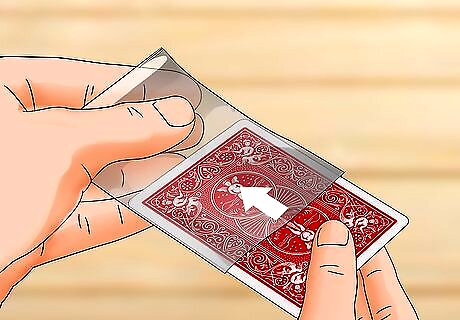
Put sleeves on your cards so they don't develop wear or tear. Card sleeves are made of clear plastic, and they help prevent any stains or damage from forming on the cards. Check the card measurement on the box and get a pack of sleeves that are the same size. Slide each individual card into a sleeve to protect them. Once all your cards are sleeved, you can easily shuffle them and keep them preserved. You can buy card sleeves online or from a hobby shop. Card sleeves come in standard and matte styles. Standard sleeves have a glossy finish and slide easily on one another, while matte cards have a rougher side to prevent them from moving around when they're stacked. Cards with sleeves are usually thicker than the original box they came in, so you may need to buy a new deck case in order to store them safely.
Fixing Common Problems
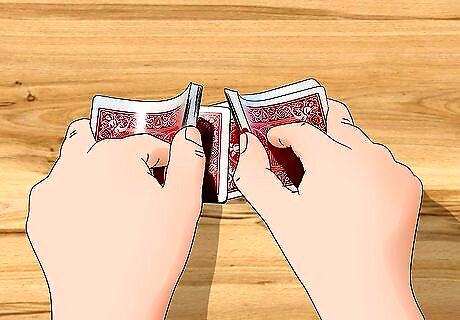
Rifle through your cards if you drop them to remove dirt particles. Hold the top and bottom edges of the deck of cards using the thumb and middle finger on your dominant hand. Place your nondominant hand 2–3 inches (5.1–7.6 cm) below the deck of cards. Gently press the top of the deck with your index finger to force the bottom cards to fall into your nondominant hand. Keep going until you push all the cards into your other hand. Repeat rifling the cards 2-3 times so they slide easily against one another. Rifling the cards helps get air between them so the dust or dirt blows off of them.
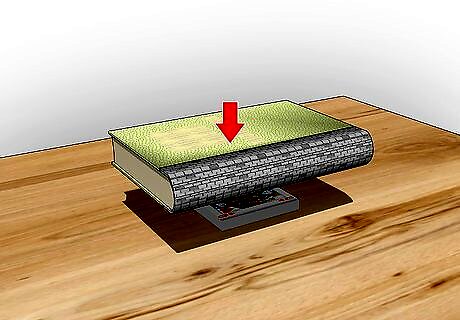
Place a weight on top of the cards to flatten warped cards. Set your deck of cards on a flat surface so the concave side of the warp is face-down. Set a thick book on top of the cards to hold them in place and keep the cards flat. Then, place a 5 lb (2.3 kg) weight on top of the book to apply more pressure to the cards. Leave the cards under the weight overnight so they can flatten out again. You can either keep the cards in their box or leave them out of the box while you're flattening them.

Trim your nails so you don't leave dents in the cards when you shuffle. When you shuffle, you press your nails into the card backs and faces and leave small dents. Cut your fingernails so they don't have any sharp edges or points so you can easily shuffle the cards. If you need to, use a nail file to smooth your nails after you cut them so they don't scratch your cards. Dents in your cards make it difficult to shuffle without them catching on one another.
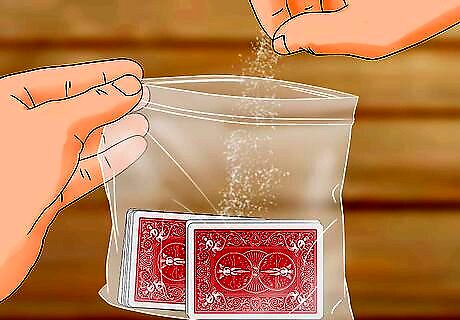
Sprinkle talcum powder or flour on your cards when they get dirty. First, try to rifle through your cards to remove as much dirt as you can. Take a small pinch of talcum powder or flour and place it in a resealable plastic bag with your playing cards. Lightly shake the bag with your cards to spread the talcum powder or flour throughout them. Take the cards out and shuffle them to remove any excess powder from them. You can buy talcum powder from drugstores.Tip: Don't use too much talcum powder or else you'll get it on your hands and table every time you use the cards.




















Comments
0 comment